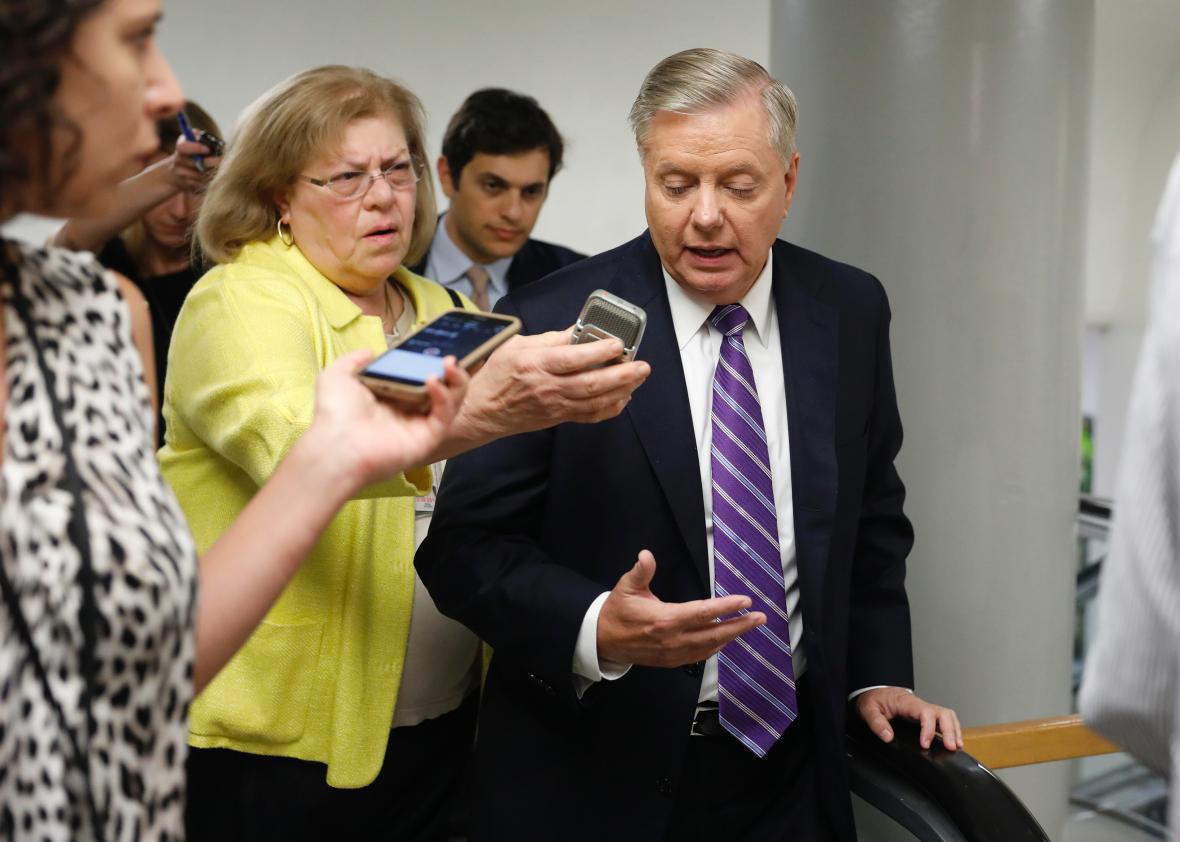By the time Sens. Lindsey Graham and Bill Cassidy at long last introduce their last-ditch effort to repeal and replace Obamacare on Wednesday morning, they will have 17 calendar days to usher it through Congress. To get it passed, they will have to get a CBO score, survive a vetting from the Senate parliamentarian, somehow earn 50 out of 52 Republican votes, and survive a “vote-o-rama” of potential amendments on the floor of the Senate. If that’s successful, the bill would then have to pass the House of Representatives. I am not putting much faith in Graham-Cassidy making it through these hurdles in such a short timeframe after every other comprehensive health care bill over many months bit the dust. And my conversations with Republican senators revealed that many of them aren’t, either.
Ask a member of the Senate Republican leadership about Graham-Cassidy’s chances, and they’ll essentially give you a very drawn out, despairing utterance of Yeeeeeeeeaaaaahhhh…. South Dakota Sen. John Thune, the No. 3 Senate Republican, told reporters Tuesday that passing the bill before their Sept. 30 deadline would be the equivalent of a “double double bank shot” that would take an “extraordinary lift.” And Senate Majority Mitch McConnell, who has absolutely zero interest in trying to wrangle 50 Republican votes for another major health care bill again, would only say at his Tuesday press conference that the “way forward is not clear.”
In other words, if the authors of the bill want to try to put together a 50-vote coalition in the next couple of weeks, they’re more than welcome to try—by themselves. “Senator McConnell has told us that if we get 50 votes, he’ll bring it up,” Cassidy said Tuesday.
Cassidy told me that getting his fellow Republicans beyond their “ACA fatigue” has been something of a challenge. Lousiana’s John Kennedy, for example, told me that “our most important priority right now is tax reform, and if we can get tax reform done then health care becomes a lot easier” when I asked him about Graham-Cassidy’s chances.
Bu Cassidy isn’t really having that. “If we may be fatigued,” he said, “think about the poor stiff who can’t afford his premium.”
As for that stiff, there is another attempt to stabilize insurance markets in 2018 being worked out between Republican Sen. Lamar Alexander and Democrat Sen. Patty Murray. Getting agreement on that proposal won’t be easy, either, as Democrats and Republicans have some sticky differences about what balance of spending and deregulation is acceptable. But that will be a lot easier than passing, on an extraordinarily rushed timetable, another comprehensive bill to remake the health insurance system in a way that ultimately shifts more health care costs to the states.
South Dakota Sen. Mike Rounds said that he liked the original concept. “Any time you get back and allow the states more of an open process, I think you’re moving in the right direction,” he said. But, he’s “also a realist, and I know it’s going to be very difficult to get the votes in order to get that particular product passed.” He’s putting his more realistic health care legislating hopes in the stabilization bill. As is Sen. Tim Scott, who noted that the repeal-and-replace effort is in the “fourth quarter with about 30 seconds left.” He’s more optimistic about the stabilization effort because “thinking small is the only way to get health care done right now.”
Some senators, up to and including McConnell, seem to not want to declare repeal-and-replace officially dead because such a pronunciation, when there’s still time on the clock, might play badly with a base that’s already furious at them. A lot more of the senators might have “ACA fatigue” than they’re letting on in conversations with reporters. It’s much easier to just let the clock run out than to declare the bill dead before it’s even unveiled.
The most direct answer I got all day, though, was from Kentucky Sen. Rand Paul. What did he put the chances Graham-Cassidy’s passage at?
“Zero,” he said. “I don’t really hear anyone talking about it.”
